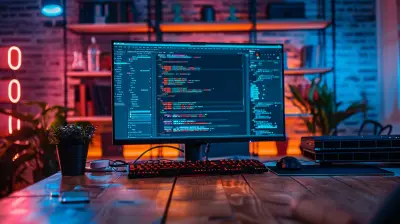The Role of Open Source Platforms in Tech Event Discussions
31 May 2025
Technology is evolving at an insane pace, and keeping up with the latest trends, innovations, and breakthroughs feels like chasing a moving train. That's why tech events—conferences, meetups, hackathons, and symposiums—are crucial. They bring together industry leaders, developers, and tech enthusiasts to discuss, share, and collaborate. But what's the secret sauce behind these discussions?
Spoiler alert: Open source platforms!
From live discussions to collaborative coding, open source tools have become the backbone of tech events. In this article, we'll dive deep into how these platforms fuel conversations, ignite innovation, and keep the tech world connected. 
The Rise of Open Source in Tech Events
Once upon a time, proprietary software ruled the tech world. If you wanted to collaborate, you were often locked into expensive, rigid systems. But then, open source arrived like a breath of fresh air.Today, open source platforms like Linux, GitHub, Mattermost, and Jitsi are forging new ways for developers, engineers, and tech enthusiasts to communicate and innovate. Whether it's for real-time discussions or live demonstrations, open source tools ensure seamless collaboration, free of licensing restrictions.
And let's be real—who doesn't love free tools that are also powerful? 
Open Source Platforms Powering Live Discussions
1. Open Source Communication Tools
Tech events thrive on vibrant discussions, and open source platforms make this possible. Here are some rockstars:- Mattermost – A Slack alternative that empowers teams with secure, self-hosted messaging.
- Rocket.Chat – A robust open-source chat app that works like a charm for live discussions.
- Jitsi Meet – A fantastic open-source video conferencing tool that eliminates the need for corporate-owned platforms like Zoom or Microsoft Teams.
Since these platforms are open source, tech enthusiasts can customize them to fit specific event needs. No more worrying about privacy concerns or feature limitations!
2. Collaborative Coding and Demonstrations
Tech events often feature live coding sessions, hackathons, and developer workshops. Enter open source platforms like:- GitHub & GitLab – Version control systems that enable developers to showcase and collaborate on projects seamlessly.
- JSFiddle & CodePen – Perfect for live coding demos where attendees can experiment in real time.
- Jupyter Notebook – A must-have for data science events allowing interactive computing.
These platforms let developers build, break, and fix things on the go—exactly what drives innovation in tech events. 
Enhancing Knowledge Sharing & Collaboration
Information is the lifeline of tech discussions. Open source platforms ensure that knowledge-sharing is smooth and accessible.1. Open Source CMS & Documentation Platforms
Documentation and knowledge repositories are critical for tech conferences, ensuring that discussions don't just vanish into thin air. Some key platforms include:- MediaWiki – The engine behind Wikipedia, perfect for open documentation.
- Read the Docs – A fantastic tool for hosting technical documentation.
- MkDocs – Enables easy creation of markdown-based documentation for developers.
These platforms help centralize event guides, technical resources, and community contributions—all without the hassle of proprietary restrictions.
2. Open Source Learning Management Systems
Workshops and training sessions are big at tech events. Open source Learning Management Systems (LMS) provide a structured way to deliver presentations, certifications, and training materials. Popular choices include:- Moodle – An open-source LMS used all over the world for e-learning.
- Open edX – A powerful tool for creating online courses and workshops.
- Chamilo – A lightweight LMS designed for easy knowledge sharing.
These platforms allow tech events to maintain an archive of training materials for attendees long after the event is over. 
The Open Source Advantage: Why It Matters in Tech Events
1. Cost-Effective
Tech events, especially community-driven ones, often run on tight budgets. Open source eliminates hefty software licensing fees and makes high-quality tools accessible to everyone.2. Flexibility & Customization
With proprietary software, you're stuck with what the provider gives you. Open source lets event organizers tweak, modify, and build on existing solutions to meet specific needs.3. Transparency & Security
One major benefit? No hidden agendas. Open source platforms allow complete visibility into their code, reducing security concerns and ensuring data privacy.4. Community-Driven Innovation
Tech is all about collaboration. With open source, developers, engineers, and IT professionals can contribute to and improve the very tools they use in tech events.5. Future-Proofing
Closed-source software can disappear overnight if the company behind it shuts down. Open source solutions keep evolving, thanks to their global contributor base.Real-World Examples: Open Source in Action
Want proof that open source is driving tech event conversations? Here are some examples:1. FOSDEM (Free and Open Source Software Developers’ European Meeting)
One of the biggest tech events dedicated entirely to open source. Thousands of developers gather to share knowledge, contribute to projects, and discuss the future of open-source technologies.2. Linux Foundation Events
From Open Source Summit to KubeCon, the Linux Foundation hosts several events where open source takes center stage. These events fuel discussions on Linux, Kubernetes, and cloud computing.3. Hacktoberfest
A month-long celebration of open source in which developers worldwide contribute to public repositories, engage in discussions, and learn from each other.These events prove that open source isn't just an alternative—it's the driving force behind some of the most influential tech discussions.
Challenges of Using Open Source in Tech Events
Of course, open source isn’t all sunshine and rainbows. It comes with a few challenges:- Technical Barriers – Many open source tools require self-hosting and configuration, which can be tricky for non-tech-savvy event organizers.
- Support & Maintenance – Unlike proprietary software with dedicated support, open source relies on community-driven support, which isn’t always instant.
- Adoption Resistance – Some organizations hesitate to use open source due to misconceptions about reliability and security.
Despite these challenges, the benefits far outweigh the drawbacks. With the right expertise and mindset, open source platforms can revolutionize tech event discussions.
The Future of Open Source in Tech Events
The role of open source in tech events is only going to grow. Here’s what the future holds:- More Decentralized Platforms – Expect a rise in self-hosted, decentralized alternatives to mainstream communication tools.
- AI & Machine Learning Contributions – Open-source AI tools will enable smarter, more interactive event discussions.
- Better Integration with AR/VR – Imagine attending a virtual tech conference with open-source XR (Extended Reality) tools!
One thing’s for sure—open source isn’t going anywhere. It’s the foundation of tech innovation, and its impact on tech discussions will only deepen.
Final Thoughts
Tech events are all about ideas, collaboration, and innovation—all values deeply embedded in the open-source philosophy. Whether it’s powering real-time discussions, facilitating coding sessions, or enabling seamless knowledge sharing, open source platforms are revolutionizing the way tech communities engage.So the next time you attend a tech event, take a moment to appreciate the open-source magic happening behind the scenes. It’s shaping the future—one discussion at a time!
all images in this post were generated using AI tools
Category:
Tech EventsAuthor:

Pierre McCord
Discussion
rate this article
3 comments
Felicity McPherson
Open source platforms enhance collaboration and innovation in tech event dialogues.
June 14, 2025 at 2:23 AM

Pierre McCord
Absolutely! Open source platforms foster collaboration and drive innovation by promoting shared knowledge and diverse perspectives in tech event dialogues.
Berenice Ford
This article astutely highlights how open source platforms foster inclusivity and innovation in tech discussions. However, it could further explore the challenges of maintaining quality control and the risk of fragmentation, which often accompany the rapid adoption of these platforms.
June 7, 2025 at 4:00 AM

Pierre McCord
Thank you for your insightful comment! I appreciate your suggestion and will consider including a discussion on quality control and fragmentation in future revisions.
Zachary McGovern
This article effectively highlights the significance of open source platforms in fostering collaboration at tech events. By promoting transparency and shared innovation, these platforms empower diverse voices and ideas, enriching discussions. However, it's crucial to acknowledge challenges, such as varying support levels and community engagement that can impact inclusivity.
June 6, 2025 at 2:20 PM

Pierre McCord
Thank you for your thoughtful insights! I agree that while open source platforms enhance collaboration, addressing challenges in support and engagement is essential for true inclusivity.



